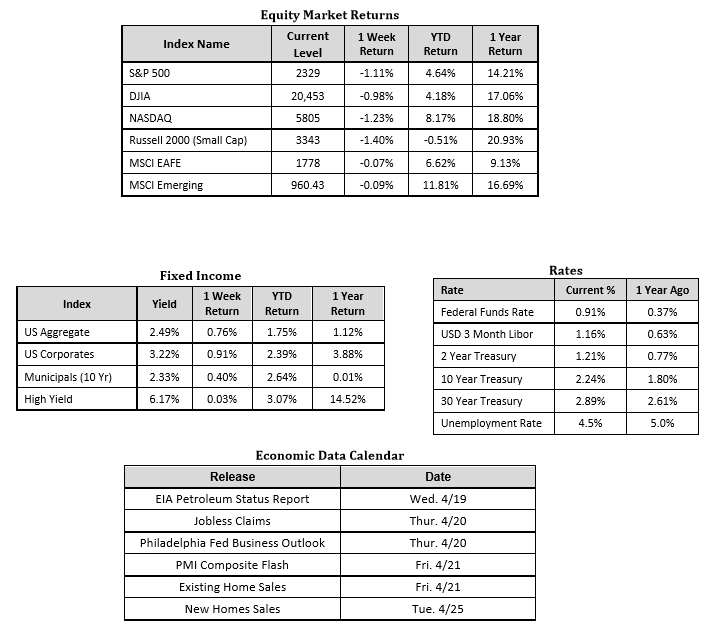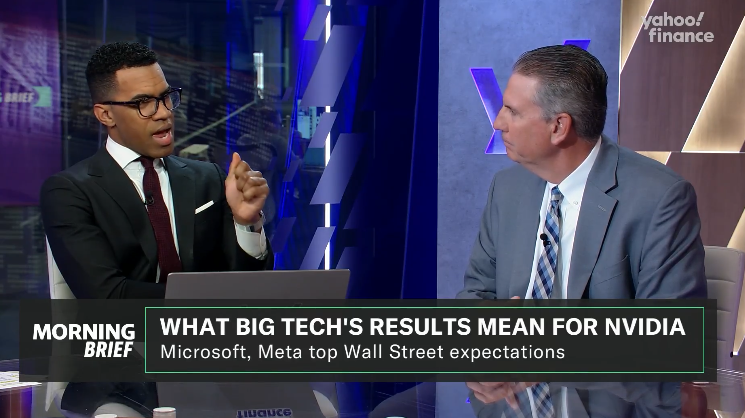
Geopolitical Risks Shake Markets
Market Overview
Sources: Equity Market and Fixed Income returns are from JP Morgan as of 4/13/17. REIT, Rates and Economic Calendar Data from Bloomberg as of 4/17/17.
Happening Now
Stocks fell last week as geopolitical concerns roiled domestic equity markets. Both the S&P 500 and Russell Midcap Indexes lost 1.1% during the holiday shortened week while small cap stocks, as measured by the Russell 2000 Index, dropped 1.4%. “Risk-off” assets such as U.S. Treasuries and Gold served as a safe haven for investors over the course of the week. As demand for bonds rose, the yield on the 10 Year U.S. Treasury fell to 2.24% while the price for one ounce of Gold increased to $1,284. Gold is now up over 12% since the start of the year. Internationally, markets in developed and emerging markets were virtually unchanged for the week.
Economic data released last week showed evidence of slower but stable conditions. Inflation, which had previously exceeded expectations thus far in 2017, showed lower year-over-year growth relative to last month. The Consumer Price Index (CPI) rose 2.4% year-over-year, down from March’s reading of 2.7% and lower than estimates which called for a 2.6% gain. Retail sales fell 0.2% from last month, due in large part to weak auto sales. This measure was also likely impacted by several bouts of unfavorable weather during the month of March. On the positive side, the consumer sentiment index showed renewed strength last week with a reading of 98 out of 100 – the seventh consecutive reading over 90. This should bode well for consumer spending and, ultimately, U.S. Gross Domestic Product (GDP) in the months and quarters to come.
First quarter earnings season started in earnest last week with financial giants JP Morgan, Citigroup, and Wells Fargo all reporting and beating estimates. Markets, however, were most impacted by geopolitical events, as the U.S. Military’s strike in Syria was further digested, a massive bomb was dropped on ISIS fighters and tunnels in Afghanistan, and tensions with North Korea grew. Diversified investors certainly saw the benefit of a fixed income allocation last week with bond prices rallying on this news and stocks, despite strong earnings reports and solid economic data, falling. The unpredictability of the capital markets was highlighted last week as was the benefits of a properly diversified portfolio. It is important to remember that not all asset allocation strategies offer the same protection in a down market or the same growth potential in an up market.
Important Information and Disclaimers
Disclosures: Hennion & Walsh is the sponsor of SmartTrust® Unit Investment Trusts (UITs). For more information on SmartTrust® UITs, please visit www.smarttrustuit.com. The overview above is for informational purposes and is not an offer to sell or a solicitation of an offer to buy any SmartTrust® UITs. Investors should consider the Trust’s investment objective, risks, charges and expenses carefully before investing. The prospectus contains this and other information relevant to an investment in the Trust and investors should read the prospectus carefully before they invest.
Investing in foreign securities presents certain risks not associated with domestic investments, such as currency fluctuation, political and economic instability, and different accounting standards. This may result in greater share price volatility. These risks are heightened in emerging markets.
There are special risks associated with an investment in real estate, including credit risk, interest rate fluctuations and the impact of varied economic conditions. Distributions from REIT investments are taxed at the owner’s tax bracket.
The prices of small company and mid cap stocks are generally more volatile than large company stocks. They often involve higher risks because smaller companies may lack the management expertise, financial resources, product diversification and competitive strengths to endure adverse economic conditions.
Investing in commodities is not suitable for all investors. Exposure to the commodities markets may subject an investment to greater share price volatility than an investment in traditional equity or debt securities. Investments in commodities may be affected by changes in overall market movements, commodity index volatility, changes in interest rates or factors affecting a particular industry or commodity.
Products that invest in commodities may employ more complex strategies which may expose investors to additional risks.
Investing in fixed income securities involves certain risks such as market risk if sold prior to maturity and credit risk especially if investing in high yield bonds, which have lower ratings and are subject to greater volatility. All fixed income investments may be worth less than original cost upon redemption or maturity. Bond Prices fluctuate inversely to changes in interest rates. Therefore, a general rise in interest rates can result in the decline of the value of your investment.
Definitions
MSCI- EAFE: The Morgan Stanley Capital International Europe, Australasia and Far East Index, a free float-adjusted market capitalization index that is designed to measure developed-market equity performance, excluding the United States and Canada.
MSCI-Emerging Markets: The Morgan Stanley Capital International Emerging Market Index, is a free float-adjusted market capitalization index that is designed to measure the performance of global emerging markets of about 25 emerging economies.
Russell 3000: The Russell 3000 measures the performance of the 3000 largest US companies based on total market capitalization and represents about 98% of the investible US Equity market.
ML BOFA US Corp Mstr [Merill Lynch US Corporate Master]: The Merrill Lynch Corporate Master Market Index is a statistical composite tracking the performance of the entire US corporate bond market over time.
ML Muni Master [Merill Lynch US Corporate Master]: The Merrill Lynch Municipal Bond Master Index is a broad measure of the municipal fixed income market.
Investors cannot directly purchase any index.
LIBOR, London Interbank Offered Rate, is the rate of interest at which banks offer to lend money to one another in the wholesale money markets in London.
The Dow Jones Industrial Average is an unweighted index of 30 “blue-chip” industrial U.S. stocks.
The S&P Midcap 400 Index is a capitalization-weighted index measuring the performance of the mid-range sector of the U.S. stock market, and represents approximately 7% of the total market value of U.S. equities. Companies in the Index fall between S&P 500 Index and the S&P SmallCap 600 Index in size: between $1-4 billion.
DJ Equity REIT Index represents all publicly traded real estate investment trusts in the Dow Jones U.S. stock universe classified as Equity REITs according to the S&P Dow Jones Indices REIT Industry Classification Hierarchy. These companies are REITSs that primarily own and operate income-producing real estate.




